

Nickel is one of the most common causes of a skin rash that occurs due to contact with an allergen, a dermatologist says.
This type of rash, allergic contact dermatitis, can be caused by nickel in jewelry, a patient’s diet, nickel in a medical implant or nickel in a medication that’s applied to the skin, said Dr. Jennifer Chen, a clinical assistant professor of dermatology at Stanford Hospital and Clinics, in Stanford, Calif.
Typically, an allergic reaction to this metal occurs in an area of skin that comes into contact with an item such as a necklace, belt buckle, zipper, eyeglass frames or cellphone.
But nickel in foods can cause an allergic reaction that is more widespread on the body. Foods high in nickel include nuts, seeds, chocolate, wheat and rye, Chen said.
“Although allergic reactions to dietary nickel are not as common as nickel allergies overall, people should be aware that the nickel in their food could cause a reaction,” Chen said in an American Academy of Dermatology news release.
If you suspect that nickel in your diet is causing an allergic reaction, consult a dermatologist, she advised.
Nickel is also used in medical implants, including orthopedic, dental, gynecological and cardiovascular devices.
“Very few people develop allergic contact dermatitis because of the nickel in their medical implant. For that reason, allergy testing before medical implant placement is usually not necessary,” Chen said.
However, people with a history of metal allergy should discuss it with their doctor before receiving a medical implant, and those who develop a rash after receiving one should talk to their doctor, she said.
Another possible source of allergic contact dermatitis is medications that are applied to the skin, such as corticosteroids.
“If you have a rash that does not improve with topical treatment, if your symptoms get worse while using a topical corticosteroid, or if your condition returns immediately after you stop treatment, talk to your dermatologist to determine whether an allergy is the source of the problem,” Chen advised.
More information
The U.S. National Library of Medicine has more about rashes.
Source: HealthDay
Copyright © 2024 HealthDay. All rights reserved.

Leave a Reply